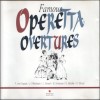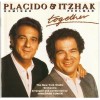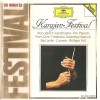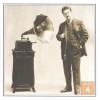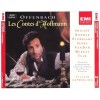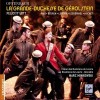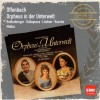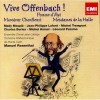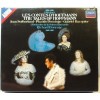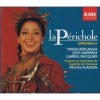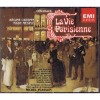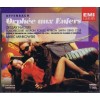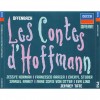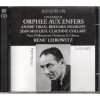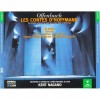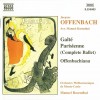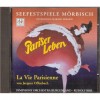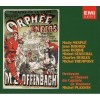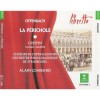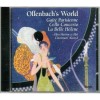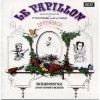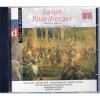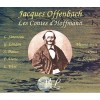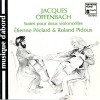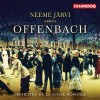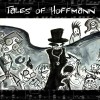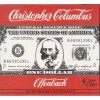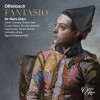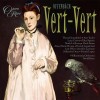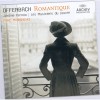Composers
Jacques Offenbach's father changed his name from Eberst to Offenbach when he settled down in Deutz in 1802. He was a very talented man who worked as a bookbinder, translator, publisher, music teacher and composer and became a cantor some 30 years later. In 1816 the family moved to Cologne, where his son Jacob was born in 1819.
In 1833 according to his father’s choice, Jacob became a cello student in the Paris Conservatoire. Financial problems made Jacques break off his studies at the end of 1834. After long searches he eventually found a job as a cellist in the orchestra of the Opéra-Comique. He soon became a famous cello virtuoso, accompanying on famous pianists like the young Anton Rubinstein, Franz Liszt, Felix Mendelssohn, and, very often, Friedrich von Flotow. In 1844, he became a Catholic and married Herminie d'Alcain. In 1848 because of the revolutionary violence, he moved to Germany with his wife and daughter. But soon they returned.
In 1850, he became conductor of the Théâtre Français, but the society of that time couldn’t understand his sometimes harsh songs and music. In 1855 he rented a little theatre on the Champs-Élysées and named it the Bouffes Parisiens. And next year he moved the Bouffes to a larger and more famous theatre on Monsigny Street, Passage Choiseul, where he began his career as operetta composer. In the early years he produced several one-act works with only a few speaking or singing characters. The most famous works were: Les deux aveugles, Ba-ta-clan (both premiering in 1855), and La bonne d'enfant . Only in 1858 he composed his first full-length work, Orpheus in the Underworld.
He was the creator of a great quantity of operettas, which are still famous nowadays. The best of these works united merry political and cultural satire with humorous grand opera parodies. His best-known operettas in the English-speaking world are Orpheus in the Underworld (1858), La belle Hélène (1864), La vie parisienne (1866), The Grand Duchess of Gerolstein (1867), and La Périchole (1868). Les brigands (1869) was also very popular in the English-speaking world initially but was later forgotten.
During Offenbach’s work with the librettists Meilhac and Halévy he produced some of his most successful works with them. He said about their relationship: Je suis sans doute le Père, chacun des deux autres est à la fois mon Fils et Plein d'Esprit (literally "No doubt I am the Father; each of the two others is at once my Son and Full of Verve"— esprit meaning both [Holy] Spirit and wit and Plein d'Esprit rhyming with Saint Esprit).
Offenbach was the real patriot; therefore many of his works are filled with love to his country. But in 1870, the beginning of war between France and Germany, he escaped from the country because he was criticized by the French press as an immigrant agent of Bismarck. But for Germany he was a traitor of his native country, so he was forced to leave his family in Spain and tour in Italy and Austria. When he returned to Paris in June 1871 after the war, his operettas were out of favor with the public. Bonaparte's followers thought that the main reason of Napoleon’s defeat and a blow to France prestige blasting were Offenbach's parodies. On the contrary, liberals blamed Offenbach for his loyalty to the emperor, and he had trouble with the police. During 1875 Offenbach became nearly a bankrupt. But after his very successful tour of the United States in 1876 on account of the U.S. Centennial Exhibition, where conducted two of his operettas La vie parisienne and La jolie parfumeuse, he could restore part of his losses. Also he gave more than 40 concerts in New York and Philadelphia.
Offenbach could return his popularity with Madame Favart (1878), which showed the life of French actress Marie Justine Favart, and La fille du tambour-major, a musically ingenious piece. His last work, The Tales of Hoffmann, is considered to be his only grand opera. It is more serious and more ambitious in its musical scope work. Because of his death in 1880 the opera remained unfinished until 1881, when it was completed by his friend Ernest Guiraud and premiered.
In 1938, Manuel Rosenthal (1904–2003) gathered the popular ballet Gaîté Parisienne from his own orchestral arrangements of melodies from Offenbach's operettas and the "barcarolle" from The Tales of Hoffman.
Offenbach died in Paris in 1880 at the age of 61 and is buried in the Montmartre Cemetery, Paris.
Recently Added
Biography
Jacques Offenbach's father changed his name from Eberst to Offenbach when he settled down in Deutz in 1802. He was a very talented man who worked as a bookbinder, translator, publisher, music teacher and composer and became a cantor some 30 years later. In 1816 the family moved to Cologne, where his son Jacob was born in 1819.
In 1833 according to his father’s choice, Jacob became a cello student in the Paris Conservatoire. Financial problems made Jacques break off his studies at the end of 1834. After long searches he eventually found a job as a cellist in the orchestra of the Opéra-Comique. He soon became a famous cello virtuoso, accompanying on famous pianists like the young Anton Rubinstein, Franz Liszt, Felix Mendelssohn, and, very often, Friedrich von Flotow. In 1844, he became a Catholic and married Herminie d'Alcain. In 1848 because of the revolutionary violence, he moved to Germany with his wife and daughter. But soon they returned.
In 1850, he became conductor of the Théâtre Français, but the society of that time couldn’t understand his sometimes harsh songs and music. In 1855 he rented a little theatre on the Champs-Élysées and named it the Bouffes Parisiens. And next year he moved the Bouffes to a larger and more famous theatre on Monsigny Street, Passage Choiseul, where he began his career as operetta composer. In the early years he produced several one-act works with only a few speaking or singing characters. The most famous works were: Les deux aveugles, Ba-ta-clan (both premiering in 1855), and La bonne d'enfant . Only in 1858 he composed his first full-length work, Orpheus in the Underworld.
He was the creator of a great quantity of operettas, which are still famous nowadays. The best of these works united merry political and cultural satire with humorous grand opera parodies. His best-known operettas in the English-speaking world are Orpheus in the Underworld (1858), La belle Hélène (1864), La vie parisienne (1866), The Grand Duchess of Gerolstein (1867), and La Périchole (1868). Les brigands (1869) was also very popular in the English-speaking world initially but was later forgotten.
During Offenbach’s work with the librettists Meilhac and Halévy he produced some of his most successful works with them. He said about their relationship: Je suis sans doute le Père, chacun des deux autres est à la fois mon Fils et Plein d'Esprit (literally "No doubt I am the Father; each of the two others is at once my Son and Full of Verve"— esprit meaning both [Holy] Spirit and wit and Plein d'Esprit rhyming with Saint Esprit).
Offenbach was the real patriot; therefore many of his works are filled with love to his country. But in 1870, the beginning of war between France and Germany, he escaped from the country because he was criticized by the French press as an immigrant agent of Bismarck. But for Germany he was a traitor of his native country, so he was forced to leave his family in Spain and tour in Italy and Austria. When he returned to Paris in June 1871 after the war, his operettas were out of favor with the public. Bonaparte's followers thought that the main reason of Napoleon’s defeat and a blow to France prestige blasting were Offenbach's parodies. On the contrary, liberals blamed Offenbach for his loyalty to the emperor, and he had trouble with the police. During 1875 Offenbach became nearly a bankrupt. But after his very successful tour of the United States in 1876 on account of the U.S. Centennial Exhibition, where conducted two of his operettas La vie parisienne and La jolie parfumeuse, he could restore part of his losses. Also he gave more than 40 concerts in New York and Philadelphia.
Offenbach could return his popularity with Madame Favart (1878), which showed the life of French actress Marie Justine Favart, and La fille du tambour-major, a musically ingenious piece. His last work, The Tales of Hoffmann, is considered to be his only grand opera. It is more serious and more ambitious in its musical scope work. Because of his death in 1880 the opera remained unfinished until 1881, when it was completed by his friend Ernest Guiraud and premiered.
In 1938, Manuel Rosenthal (1904–2003) gathered the popular ballet Gaîté Parisienne from his own orchestral arrangements of melodies from Offenbach's operettas and the "barcarolle" from The Tales of Hoffman.
Offenbach died in Paris in 1880 at the age of 61 and is buried in the Montmartre Cemetery, Paris.
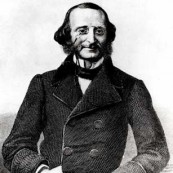
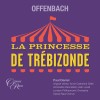
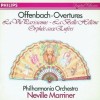



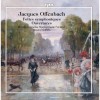
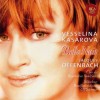

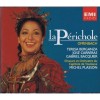
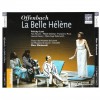
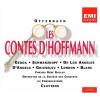
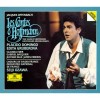


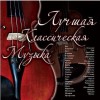
![Great Voices Of The Century - Sopranos, The Greatest Arias [CD1 of 4]](http://static.classicalm.com/repository/collection-cover/small/1401-img1403276640837603.jpg)
![Deutsche Grammophon Classic Gold [CD 3 of 3]](http://static.classicalm.com/repository/collection-cover/small/1316-img1361384204300956.jpg)

![Christmas Adagios [CD2 of 2]](http://static.classicalm.com/repository/collection-cover/small/1221-img1354501874563438.jpg)
![The Top 100 Masterpieces of Classical Music 1685-1928 [CD7of10]](http://static.classicalm.com/repository/collection-cover/small/1359-img1372446248695097.jpg)






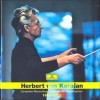
![The 100 Most Beautiful Melodies [CD 3 of 6]](http://static.classicalm.com/repository/disk-cover/small/2912-img1361461642604961.jpg)
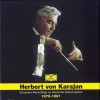

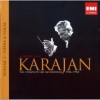
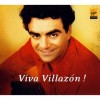
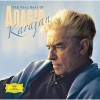
![Rita Streich - The Viennese Nightingale [CD 4 of 8]](http://static.classicalm.com/repository/disk-cover/small/3037-img1372357313822809.jpg)
